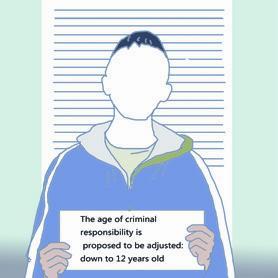Should the Age of Criminal Responsibility Be Lowered?

The age of criminal responsibility in China is currently 16, with those aged between 14 and 16 facing criminal liability only if they commit serious violent offenses, such as intentional homicide, rape or robbery. Chinas criminal code at present holds that no child under the age of 14 can be held criminally liable, which means that children under 14 cant be arrested or charged with a crime.
On October 13, a draft amendment to the Criminal Law was submitted for a second review by the National Peoples Congress Standing Committee, the countrys top legislature. The aim of the amendment is to better respond to serious violent offenses by minors.
The news of the age revision in the draft amendment has attracted huge attention, mostly because recent years have seen a growing number of violent offenses committed by very young people.
The vast majority of Chinese believe lowering the age of criminal responsibility is a necessary adjustment. Nowadays, most children have easy access to the Internet and online contents, and thus children are found involved in criminal cases that they were unlikely to get involved in the past. Additionally, statistics from the Supreme Peoples Procuratorate indicate that cases of intentional injury, robbery and rape brought against minors are on the rise, and most are brought against children aged between 12 and 14. In this sense, the publics support for the adjustment is understandable, as it will help to deter potential crimes among juveniles.
Others argue lowering the age of criminal responsibility wont help as much as expected, and may even cause undue lifelong damage to delinquents. This is especially true given that many of these young offenders are themselves victims of their environments. Additionally, early adolescence is a period marked by neurodevelopmental immaturity, and the offenders have limited competence. For these reasons, some believe improving the societal and familial environments juveniles are exposed to is a preferable method of reducing crime rates. Appropriate corrective education is also seen as having an important role in helping delinquents lead a normal life, benefiting both individuals and society.
More than age
Zhang Hongwei (The Beijing News): The growing number of violent offences committed by juvenile delinquents has made lowering the age of criminal responsibility urgent. Chinas judicial system focuses on the redemption of delinquents, with punishment playing only an auxiliary role. While this dynamic is still necessary and useful, being too kind or tolerant to problematic minors can backfire, rather than assisting in rehabilitation.
Cases where perpetrators of serious violent crimes are not tried as criminals due to their young age usually trigger a strong backlash from society, especially the victims and their families, and cause society to doubt the countrys judicial system.
Simply lowering the age of criminal responsibility will not eradicate crimes by minors or prevent minors from repeating offences.
Therefore, the draft amendment not only lowers the age of criminal liability for serious offenses such as homicide, rape and robbery to 12, but also establishes mechanisms for offering corrective education to minors under 16 who are exempt from criminal punishment.
Age is only one factor in considering whether one should receive criminal punishment. Exemption, redemption, correction, and punishment for minor offenders should be carried out on a case-by-case basis.
Yu Gui(www.china.com.cn): Minors committing serious crimes is no longer news in China, and the fact that these minors are exempt from criminal responsibility plays a big role in encouraging minors to take part in crimes. As the number of minors taking part in serious crimes continues to rise, so too does public sentiment in favor of lowering the age of criminal responsibility.
In regard to the reason for lowering the criminal age, some lawyers have argued that analyses of numerous crimes reveal that minor offenders judgment and mental maturity commonly surpasses that of ordinary minors at the same age. However, this explanation is not sufficiently convincing to warrant a change to the criminal age. These lawyers understanding is based only on their own subjective judgment, rather than the objective facts and evidence upon which the judicial system should rely. Its thus unscientific and goes against the judicial spirit to arbitrarily change the age. Some people believe that delinquents criminal offences arise from their mental immaturity or flaws of judgment.
This immaturity may result in ignorance of the law, a lack of understanding of the law, an inability to distinguish right from wrong, or an inability to understand the impacts of their actions on themselves or others.
Similarly, lowering the age may be viewed as a form of inaction on the part of the countrys judicial system. As far as minor offenders are concerned, the purpose of the judicial system is not to punish, but to correct their behaviors. To a large extent, their family background and even the society at large should take the bigger share of responsibility for their committing crimes at such an early age. There is merit in improving the environment in which young offenders grow up. In many countries, there are juvenile courts and prosecutors, but the juvenile judicial system in China obviously pales in comparison. Thus, the judicial system has a lot of urgent work to do to help minors correct themselves, instead of focusing on the age.

Undeniably, to some extent, lowering the age will help to deter potential minor offenders from committing crimes, but if a young child is criminalized, this stain will remain on their record, affecting them for the rest of their life. In this sense, its difficult to predict whether lowering the age will help or not.
The experiences of some delinquents have shown that if not properly handled, criminal punishment will only spur their impulses to commit more crimes after they are released from prison.
Age not a free pass
Mo Cheng (pinglun.youth.cn): When it comes to judicial protection for minor criminal offend- ers, on one hand, further damage to society must be prevented, but on the other hand, the juveniles healthy growth and future development should also be taken into consideration.
Today, those under the age of 14 are not held criminally responsible, no matter what horrendous crimes they commit, and those who are between 14 and 16 years will not be criminalized unless the crimes are extremely serious. These regulations were originally enacted to protect the juvenile but in practice, they are taken advantage of by some children as a free pass to do whatever they want.
In recent years, China has witnessed a surge of criminal cases involving minors under the age of 14. For example, at the end of 2018, a 12-year-old boy in Hunan Province in central China killed his mother using a knife just because he did not want to be disciplined. Embarrassingly, this boy was free from criminal punishment as he was not 14 years old at that time, despite the fact that the crime he committed was especially heinous. According to current Chinese laws, in such cases, guardians shall be ordered to subject the minor to strict discipline; when necessary, they may also be taken in for correction by the government.
The draft amendment has been proposed in order to curb juveniles impulse to commit crimes by lowering the age to 12, but still its highly dubious whether this adjustment will be effective.
Delinquents cause damage to society, while at the same time, they are also victims of unfriendly environments. Thus, neither incarcerating them like ordinary criminals, nor directly setting them free without consequence is the best choice. We now urgently need an effective correctional education system for delinquents, plus more friendly social and family environments for them to grow up in.
Meanwhile, it is also necessary to change the current judicial practice that parents are given discretion to decide where delinquents can go. Once its proved that crimes have been committed, the young criminal offenders rehabilitation must be placed in the hands of a correctional education authority.
Apart from these efforts, its also important to raise both the juvenile and their guardians awareness of the law. Preventive measures are more important in deterring crime when it comes to minors, as they are still on the starting line of life.

